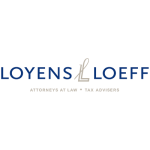Vassiliyan Zanev and Arnaud Barchman of Loyens & Loeff explain what Luxembourg has been doing to make it the EU Islamic finance hub
The legal and regulatory framework of the financial sector in Luxembourg is known to accommodate financial players and products from traditions and cultures all over the globe. As a result, no considerable amendments or new pieces of legislation were necessary to enable the development of Islamic finance in Luxembourg.
Luxembourg was the first western country to host an Islamic financial institution, back in 1978. The Luxembourg Central Bank was the first European institution to become a member of the Islamic Financial Services Board (IFSB), which is the prudential and supervisory body for Islamic financial institutions. For years now, a specific committee has existed within Luxembourg's Ministry of Finance, which supervises and considers questions relating to Islamic finance. This committee hosts representatives of the Ministry of Finance, and also from the Ministry of Foreign Affairs, the Supervisory Commission of the Financial Sector (the CSSF), and the Luxembourg Bankers' Association. The CSSF has entered into several memoranda of understanding with regulators and other financial sector players in Bahrain, Qatar, Malaysia and the United Arab Emirates (UAE). The Luxembourg tax authorities have also clarified their positions with respect to Islamic financial products in order to ensure the smooth development of such products in and from Luxembourg.
The Luxembourg Stock Exchange (LuxSE) was a precursor in the field of Islamic finance and in 2002 became the first European stock exchange to list sukuk (quasi Islamic finance debt instruments). Since then, issuers from Malaysia, the UAE, Pakistan and Saudi Arabia have listed sukuk in Luxembourg. In 2011, the CSSF published guidance regarding the regulatory treatment of sukuk issuances.
Luxembourg is widely recognised as one of the European centres for Islamic finance, as a result of a long and substantial track record in the sector. There is strong support from both the Luxembourg authorities (including the CSSF, central bank and the Ministry of Finance) and the private sector, to attract and develop further Islamic financial institutions and products in and from Luxembourg.
Sukuk in brief
Sukuk is the plural of sakk, which is Arabic for certificate. From a high level perspective, sukuk bear similarities close to conventional bonds, taking more precisely the form of asset-backed bonds. Sukuk are often referred to as Islamic bonds, despite the fact that they are in reality investment certificates with their own specific features, essentially evidencing an undivided pro rata ownership right in respect of an underlying tangible asset.
By virtue of the principles governing Islamic finance, conventional debt instruments providing for a determined interest rate are prohibited. As a result, sukuk must be structured in a way that their holders run a credit risk and receive part of the profit, rather than an interest payment fixed beforehand. Typically, it is the sukuk holder rather than the issuer who will be considered as the owner of the underlying asset; they will hold an undivided ownership right. In this context, the risks linked to the underlying assets will be shared among the holders of sukuk pro rata their investment. In this framework, the fund flows from the underlying assets must be directly linked to the funds received as profits by investors. The Luxembourg tax authorities consider that remuneration paid to sukuk holders will in principle be tax deductible.
Sukuk can be issued by sovereign entities or companies. Sukuk can be listed on stock exchanges and thus take the form of tradable shariah-compliant capital market financial instruments, providing for medium- to long-term fixed or variable rate of return. In such case, sukuk are also liquid instruments that can be traded on the secondary markets.
Listing sukuk
Established in 1927, the LuxSE is one of the major centres for the listing of international debt securities. It lists some 45,000 securities, of which 30,000 are bonds issued by 3,500 issuers from 105 countries around the world.
The LuxSE was the first European stock exchange to enter the sukuk market. Since then it has admitted to trading 16 sukuk, including issuers from Malaysia, Saudi Arabia, the UAE, and Pakistan. Sukuk have been listed both on the EU regulated market and the Euro MTF [multilateral trading facility], the two markets operated by the LuxSE. The total amount of listed sukuk issuance varies from $100 million to over $1 billion.
In comparison with other international sukuk listing places, a listing in Luxembourg is generally considered a highly competitive alternative. The admission process for listing of sukuk on one of the markets of the LuxSE is fast and secure. For instance, in the case of a sukuk listing on the Euro MTF, the time for review by the LuxSE is usually estimated at around five business days upon initial filing of the prospectus and two business days for each additional draft.
Regulatory framework for listings
In Luxembourg, sukuk issuers have a choice between two markets.
First, the EU regulated market, which complies with European legislation. This market is regulated by the CSSF and prospectuses must meet the requirements of the Luxembourg law of July 10 2005 on prospectuses for securities. As a regulated market in terms of European regulations and directives, the relevant harmonised prospectus, transparency and market abuse regulations and directives will apply.
Second, the Euro MTF market enables issuers who do not require a European passport to obtain a listing in a recognised financial centre in Europe. Issues on the Euro MTF market are authorised by the LuxSE itself. By reason of its status, a listing on the Euro MTF market does not offer a passporting feature in other member states of the EU. The regulatory framework is, however, less stringent, as compliance with the European prospectus and transparency regulations and directives is not necessary.
For the purposes of a listing on one of the markets operated by the LuxSE, no minimum number of investors is required. However, the securities must generally be freely negotiable. The minimum aggregate value of the securities on issuance must be more than €200,000 ($263,000).
On January 26 2011, the CSSF issued guidance relating to the content of sukuk prospectuses, in view of improving legal certainty and the protection of investors. According to the CSSF, sukuk may be viewed as asset-backed securities in the sense of article 2.5 of Commission Regulation (EC) 809/2004 of April 29 2004 (Prospectus Regulation) or, subject to certain conditions, as guaranteed debt securities in the sense of article 23.2 and annex VI of the Prospectus Regulation. As a matter of fact, provided that payments of principal and the periodic revenues under the sukuk are guaranteed on a contractual basis by one or several underlying entities (that is, when the payments of principal and the periodic distributions are independent from the performance of the underlying asset), the CSSF takes the view that such underlying entities can be described in accordance with the provisions of annex VI of the Prospectus Regulation (that is, information to be provided for guarantees).
Sovereign sukuk issuance
On July 9 2014, the Luxembourg parliament approved a draft bill relating to a sale and buy-back transaction of real-estate assets for the issuance of sukuk by the Luxembourg state (the Sukuk Law). With such approval, the Ministry of Finance has paved the way for the issuance of a sovereign sukuk issuance by the Luxembourg state, which is considered by many as a milestone in the development of Islamic finance in Luxembourg.
The Sukuk Law authorises the Luxembourg government to issue sukuk for an aggregate value of €200 million in connection with the sale and buy-back transaction of three prime real estate assets. In this way, it takes the form of al-ijara sukuk. The issuance will rank among the first sovereign sukuk issuances by western states (preceded by the German state of Saxony-Anhalt which issued sukuk in 2004, and more recently the government of the UK, which successfully issued sukuk on June 25 2014).
The Luxembourg Council of State (Conseil d'Etat) initially questioned the rationale of a sukuk issuance. Among others, it was argued that this form of financing would be more expensive than conventional bonds, notably by reason of the constraint to put in place a shariah committee. The task of a shariah committee, composed of experts in Islamic finance, is to ensure that the underlying assets comply with the requirements of Islamic finance, not only at the time of the launch of the transaction and the selection of the underlying assets, but also during the lifetime of the transaction.
The economic rationale underlying the transaction has been left to be justified by the government. There were also concerns over the liability of the Luxembourg state in case of total or partial loss of the underlying buildings, and the tax treatment of the sukuk. The Council of State raised additional questions on the draft bill, as it did not provide information on the placement of the sukuk, their denomination, their 'coupon' and the targeted investors. The Luxembourg government more or less addressed those points in the final text of the law. Notably, the Luxembourg government argued that a sukuk issuance should rather be viewed as a means to attracting and promoting Islamic finance in Luxembourg, rather than focusing on the costs. Even where such cost would be higher than conventional bonds, the Luxembourg government argued that they should be seen as an investment in the development and promotion of Islamic finance in Luxembourg. The targeted investors are limited to large Islamic finance institutional investors (leaving aside retail investors for the time being).
The contemplated transaction
The Sukuk Law authorised the sale of three office buildings to a Luxembourg incorporated special purpose vehicle (SPV). The office buildings consisted of the two emblematic towers of the Gate of Europe (Porte de l'Europe) located in the Kirchberg plateau (the seat of European institutions and of the main financial district) and one administrative building located in the immediate vicinity of the city centre of Luxembourg.
The Sukuk Law further authorises the Luxembourg government to grant a guarantee to the SPV for all losses and damages to the sold buildings. As such, the Luxembourg state will indemnify the SPV for all claims against the SPV which are directly or indirectly connected to the ownership, lease, sub-lease transfer, repurchase and management of the sold buildings.
The contemplated transaction will include the following steps. In the first place, the Luxembourg state incorporates the SPV in the form of a Luxembourg public limited liability company. All the shares in the SPV will be held by the Luxembourg state. The SPV then issues sukuk for a maximum aggregate amount of €200 million. With the proceeds, the SPV purchases the underlying assets, being the office buildings owned by the Luxembourg state. As required under Luxembourg law, the sale will be made through notarial deed, and the purchase price for the buildings will be paid with the proceeds raised from the issuance of the sukuk to their holders. The monies received by the Luxembourg state further to such sale will be used to finance public investment projects, such as infrastructure, roads or railroad projects.
While the sukuk are outstanding, the buildings will remain indirectly in the estate of the Luxembourg state, through the SPV. However, the SPV will not as such be considered the legal owner of the buildings, since by virtue of the features of the sukuk, sukuk holders will collectively be the legal owners of the underlying buildings. Therefore, the SPV will act as trustee on behalf of the sukuk holders and be entrusted with the management and the maintenance of the buildings.
The SPV will lease the buildings to the Luxembourg state for a term of five years, against the payment of rent. The Luxembourg state will continue to sub-lease the premises to the current tenants. The rents received by the SPV, which constitute the incomes of the underlying assets of the sukuk, will be partially paid to the sukuk holders as periodic profits on their investment.
At the end of the five years period, the SPV will resell the three buildings to the Luxembourg state for a pre-determined price of €200 million (or its equivalent in dollars). The repurchase price will then be distributed by the SPV to the sukuk holders, constituting the last step of the transaction.
Luxembourg SPVs for sukuk issuances
The flexible and creative legal framework in Luxembourg enables the use of Luxembourg shariah SPVs established: (i) as securitisation vehicles (SV), governed by the law of March 22 2004 on securitisation (Securitisation Law); or (ii) as non-regulated ordinary commercial companies (commonly referred to as sociétés de participations financières or Soparfis). Both regimes have offered various solutions suitable for Islamic investors.
The Securitisation Law defines securitisation as a transaction by which an SV acquires or assumes, directly or indirectly through another undertaking, risks relating to claims, other assets, or obligations assumed by third parties or inherent to all or part of the activities of third parties, and issues securities, the value or yield of which depends on such risks.
Both SVs and Soparfis may issue sukuk. There is a high degree of contractual flexibility and, accordingly, an SV may issue securities the value or yield of which is linked to specific compartments, assets or risks, or the repayment of which is subject to the repayment of other instruments, certain claims or certain categories of shares. Insolvency remoteness can be achieved through the use of limited recourse, non-petition and subordination provisions in the issuance or constitution documentation of the SV.
An SV formed as a corporate body or a securitisation fund may be compartmentalised, meaning that each compartment represents a distinct part of the assets and liabilities of the SV. The compartmentalisation allows for the segregation of the assets and liabilities between various compartments, whereby assets are ring-fenced on a compartment by compartment basis in the case of insolvency of the SV. Where the rights of investors and creditors relate to a specific compartment or have arisen in connection with the creation, the operation or the liquidation of a specific compartment, the recourse is limited to the assets of the relevant compartment. Between investors, each compartment is treated as a separate entity, unless otherwise provided for in the constitutional documents of the SV.
An SV company is subject to Luxembourg corporate income tax and municipal business tax. However, an SV company benefits from a special tax deduction right, which aims to achieve corporate income tax neutrality. Under such right, commitments to investors and other creditors are tax-deductible. The SV is exempt from the annual net wealth tax. Payments of dividends or interest are not subject to withholding tax (except payments falling within the scope of Directive 2003/48/EC of June 3 2003 on taxation of savings income).
An innovative transaction
In 2012, the German-based FWU Group issued a $55 million sukuk, through a Luxembourg SPV, established as a Soparfi (the issuer), with intellectual property rights (a software programme) as the underlying asset. FWU Group, which primarily offers global takaful (Islamic insurance) solutions through strategic cooperation and distribution arrangements in Europe, the Middle East and Malaysia, entered into the transaction through the Dubai branch of its subsidiary FWU Dubai Services (the seller) to refinance its shariah-compliant global factoring business. The issuer purchased from the seller a computer software programme developed and designed for the distribution of shariah-compliant takaful products (the software). The issuer then leased the software to the seller and for this purpose, a leaseback (al-ijara) agreement was entered into between the issuer as lessor and the seller as lessee.
The issuer issued sukuk with a total face value of $55 million and the proceeds from the issue were used to pay the seller for the purchase of the software. This was at the time the first sukuk issuance by a German corporate and the largest ever sukuk from a European corporate. It was also the first sukuk issue anywhere to use intellectual property rights (in this case a software programme) as the underlying asset of this sukuk, making this transaction groundbreaking in a number of ways.
The deal also had a significant impact on the financial services industry by enlarging the possibilities for shariah-compliant structured finance transactions and adding new asset classes (such as intellectual property rights), which may back the sukuk issuances.
Financing of SVs
The acquisition of securitised risks by an SV must be financed through the issuance of securities, the value or yield of which is linked to such risks. As such, there is no definition of securities in the Securitisation Law. The CSSF considers that the following will be recognised as securities for the purposes of the Securitisation Law: (i) instruments which are considered securities under their governing law (lex contractus); and (ii) instruments which constitute securities within the meaning of Directive 2004/39/EC of April 21 2004 on markets in financial instruments.
One of the major reasons behind the popularity of the Luxembourg SV is the large range of eligible assets (other than interest-bearing assets), which can be securitised through such vehicles. According to the Securitisation Law, risks relating to the holding of assets, whether movable or immovable, tangible or intangible, and risks resulting from the obligations assumed by third parties or relating to all or part of the activities of third parties, may be securitised.
Over the last few years, the securitisation transactions in Luxembourg have included diverse shariah-compliant asset classes, such as al-ijara and al-murabaha contracts, intellectual property rights, real estate and whole businesses. The scale, success and innovative aspects of such transactions have been instrumental in the development of shariah-compliant structured finance, and have taken Luxembourg to another level as a hub for such issuances and for Islamic investors in general.
Europe's leader
Luxembourg has been working hard to develop its attractiveness as a centre for Islamic finance, involving players from both the public and private sectors. Several shariah-compliant securitisation and structured finance transactions have been implemented in Luxembourg, which has now gained international recognition as a structured finance hub for Islamic investors. Its success is confirmed by the significant number of shariah vehicles incorporated in Luxembourg and their sukuk issuances, as well as the diversity in terms of structures and underlying assets.
With explicit support from the Luxembourg authorities, the forthcoming issue of sovereign sukuk by the government will help Luxembourg boost its Islamic finance credentials. It is hoped that it will attract the establishment and development of Islamic banks and respond to the needs of the multiple Islamic investment funds domiciled in Luxembourg.
About the author |
||

|
|
Vassiliyan Zanev Loyens & Loeff T + 352 466 230 257 M + 352 691 963 090 E vassiliyan.zanev@loyensloeff.com Vassiliyan Zanev is an attorney at law and partner at Loyens & Loeff Luxembourg. He is a member of the banking and finance practice group, and specialises in securitisation, structured finance, capital markets, lending and regulatory work. Before joining Loyens & Loeff, Zanev acquired three years of banking and finance experience in a major UK-based law firm in Luxembourg. He has an LLB from Nottingham Trent University, an LLM from Glasgow University, and a degree in business law from University Robert Schuman, Strasbourg. Vassiliyan was admitted to the Luxembourg Bar in 2003. He is fluent in French, English and Bulgarian. |
About the author |
||

|
|
Arnaud Barchman Loyens & Loeff T + 352 466 230 311 M + 352 691 963 083 E arnaud.barchman@loyensloeff.com Arnaud Barchman is an associate in the banking and finance department of Loyens & Loeff Luxembourg. Barchman specialises in national and cross-border financial transactions, including secured lending, debt restructuring and acquisition finance. He also advises on capital markets transactions, such as debt and equity issuances, and on financial markets regulations and securities laws. Before joining Loyens & Loeff, Barchman acquired three years' experience in a major UK-based law firm in Brussels. Barchman has been a member of the Brussels Bar since 2008 and was admitted to List IV of the Luxembourg Bar in 2012. He has an LLM from the University of Edinburgh Law School, and a Licence en Droit from the University of Louvain-la-Neuve. He is fluent in French, English and Dutch. |

